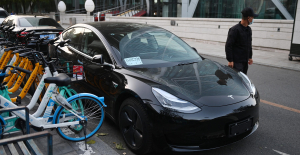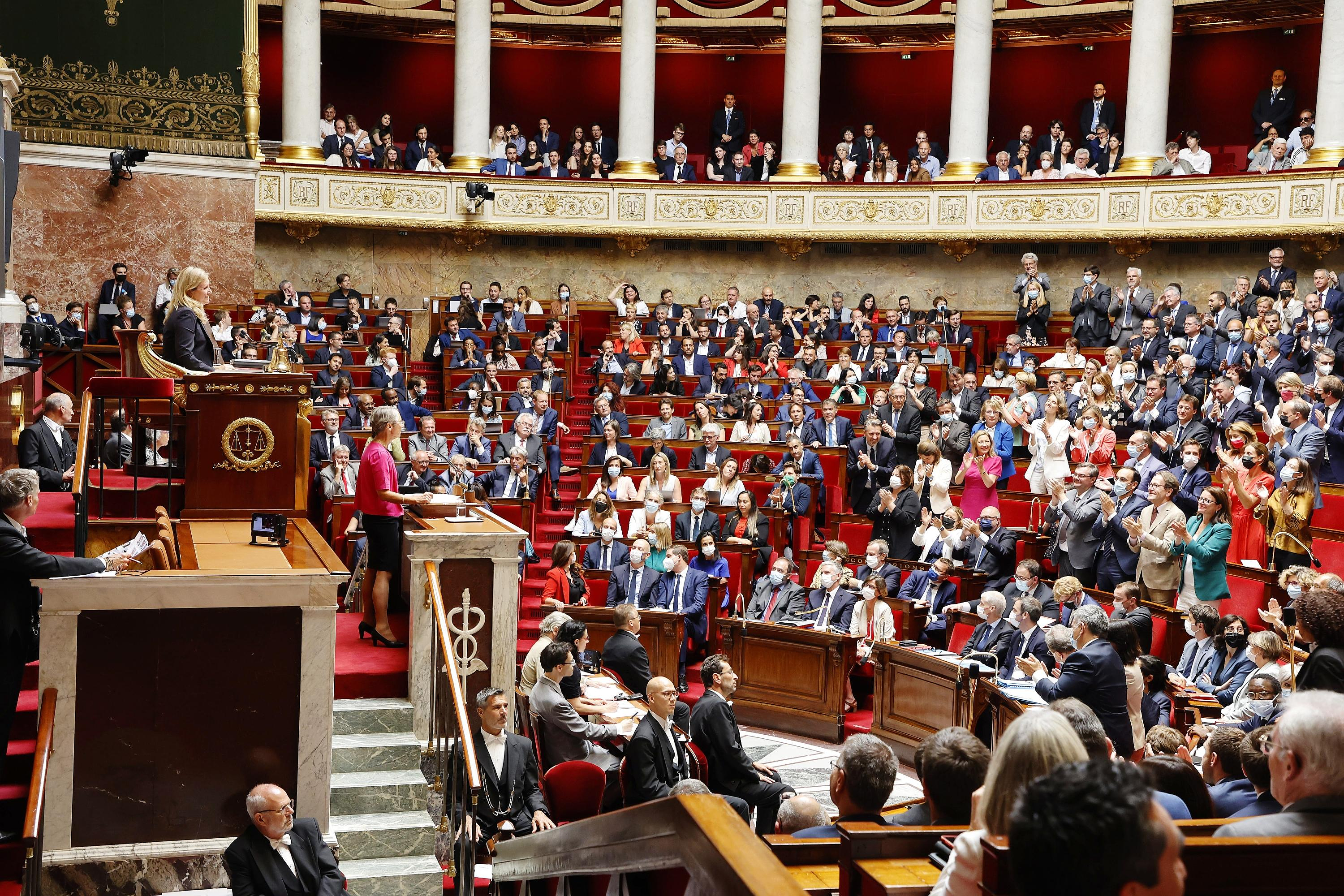Iraq on Monday signed agreements with TotalEnergies for a ten billion dollar megaproject aimed in particular at exploiting gas flared on southern oil fields and producing solar energy, to compensate for the shortcomings of an electricity network. failing. After the tensions and long negotiations that accompanied this megaproject unveiled in 2021, the CEO of TotalEnergies Patrick Pouyanné and the Iraqi Minister of Petroleum Hayan Abdel-Ghani initialed the agreement during a ceremony organized at the Ministry of Petroleum in Baghdad. "Today we are committed with Total and all the partners towards a serious and fruitful cooperation, to begin the implementation of these contracts on the ground", welcomed the Iraqi minister, during a speech preceding the signature of the four projects.
The announcement comes at a time when Iraq, extremely rich in hydrocarbons, is trying to attract foreign investors to modernize its infrastructure, ravaged by decades of conflict, poor governance and endemic corruption. Some of the investments planned by the TotalEnergies megaproject will contribute to modernizing a deliquescent electricity sector: on a daily basis, the 42 million Iraqis live with load shedding that can last up to 10 hours a day, particularly intolerable in summer when temperatures reach around 50 degrees.
"Things are in order, the partnership is consolidated: TotalEnergies keeps 45% of the project, the Basrah Oil Company 30% and QatarEnergy joins us at 25%," Patrick Pouyanné told AFP on Monday. During a speech, he hailed a "historic day": "TotalEnergies was born in Iraq in 1924, almost a century ago, so it is very symbolic for me (...) to be here today to maintain and continue this history".
Asked by AFP, the Deputy Minister of Oil in charge of extraction, Bassem Khdeir, assured that "the concrete steps on the ground: the construction of infrastructure, studies", will begin "in a month". But it will take three years for the projects to “bear fruit”, he said. A first project aims to recover flared gas from three oil fields in order to supply gas to the country's power stations. As old as the oil industry, this extremely polluting practice consists of burning the gas escaping during the extraction of crude oil. And Iraq is the second country in the world to use this process as much, just behind Russia, according to the World Bank.
A second project aims to develop a giant 1 GW solar power plant to supply the electricity grid in the Basra region (south). A third concerns the increase in production from the Artawi oil field (south) to 210,000 barrels/day. A final component concerns the construction of a seawater treatment plant to supply the water needed for the oil fields and contribute to the supply of drinking water to Basra.
This project will eventually provide five million barrels of water per day, according to figures released Monday during the ceremony in Baghdad. "Today's agreements launch the work (...), on the ground we will mobilize the teams this summer", assured Patrick Pouyanné to AFP. He expects to deliver “the first tranche” of the solar plant “within two years”. But the work of the Megaproject should be completed in 2027-2028, he continued. “We will have delivered both the water, the reduction in gas flaring, the oil field in production and the entire solar plant,” said Patrick Pouyanné.
In Iraq, the power stations are ultra-dependent on the gas supplied by the influential Iranian neighbor, which regularly cuts its supply, aggravating a little more the daily load shedding. The authorities are therefore seeking to diversify their energy sources. In particular, they aim to gradually eliminate gas flaring by 2030 with the aim of “achieving self-sufficiency” by exploiting this gas which will then supply its power stations, assures Bassem Khdeir.

 Who was Dror Or, the Israeli father who died as a hostage in the hands of Hamas?
Who was Dror Or, the Israeli father who died as a hostage in the hands of Hamas? “Pay in cash”: at his trial, Donald Trump faced with an embarrassing recording
“Pay in cash”: at his trial, Donald Trump faced with an embarrassing recording Italy: a grandmother accidentally serves a bottle filled with wine to a baby, he has an alcoholic coma
Italy: a grandmother accidentally serves a bottle filled with wine to a baby, he has an alcoholic coma The mysterious skeletons of Hermann Göring's villa
The mysterious skeletons of Hermann Göring's villa Children born thanks to PMA do not have more cancers than others
Children born thanks to PMA do not have more cancers than others Breast cancer: less than one in two French women follow screening recommendations
Breast cancer: less than one in two French women follow screening recommendations “Dazzling” symptoms, 5,000 deaths per year, non-existent vaccine... What is Lassa fever, a case of which has been identified in Île-de-France?
“Dazzling” symptoms, 5,000 deaths per year, non-existent vaccine... What is Lassa fever, a case of which has been identified in Île-de-France? Sánchez cancels his agenda and considers resigning: "I need to stop and reflect"
Sánchez cancels his agenda and considers resigning: "I need to stop and reflect" Health carpooling, this source of savings which arouses the ire of patients and taxis
Health carpooling, this source of savings which arouses the ire of patients and taxis Tesla Model 3, MG4 and Dacia Spring.... With the end of the ecological bonus, these electric cars produced in China are seeing their sales fall
Tesla Model 3, MG4 and Dacia Spring.... With the end of the ecological bonus, these electric cars produced in China are seeing their sales fall For the 2024 Olympics, Airbnb commits to fighting prostitution in its accommodation
For the 2024 Olympics, Airbnb commits to fighting prostitution in its accommodation “Shrinkflation”: supermarkets obliged to alert their customers from July 1
“Shrinkflation”: supermarkets obliged to alert their customers from July 1 The electro of Justice and the echoes of Portishead
The electro of Justice and the echoes of Portishead 1924 Olympic Games: according to his daughter, the hero of Chariots of Fire was “not a bigot”
1924 Olympic Games: according to his daughter, the hero of Chariots of Fire was “not a bigot” The “German Brothel” in Yvelines: an uncertain future for the ruined residence
The “German Brothel” in Yvelines: an uncertain future for the ruined residence The eye of the INA: when Paul Auster visited Bernard Pivot
The eye of the INA: when Paul Auster visited Bernard Pivot Omoda 7, another Chinese car that could be manufactured in Spain
Omoda 7, another Chinese car that could be manufactured in Spain BYD chooses CA Auto Bank as financial partner in Spain
BYD chooses CA Auto Bank as financial partner in Spain Tesla and Baidu sign key agreement to boost development of autonomous driving
Tesla and Baidu sign key agreement to boost development of autonomous driving Skoda Kodiaq 2024: a 'beast' plug-in hybrid SUV
Skoda Kodiaq 2024: a 'beast' plug-in hybrid SUV The home mortgage firm rises 3.8% in February and the average interest moderates to 3.33%
The home mortgage firm rises 3.8% in February and the average interest moderates to 3.33% This is how housing prices have changed in Spain in the last decade
This is how housing prices have changed in Spain in the last decade The home mortgage firm drops 10% in January and interest soars to 3.46%
The home mortgage firm drops 10% in January and interest soars to 3.46% The jewel of the Rocío de Nagüeles urbanization: a dream villa in Marbella
The jewel of the Rocío de Nagüeles urbanization: a dream villa in Marbella Facing Jordan Bardella, the popularity match turns to Gabriel Attal’s advantage
Facing Jordan Bardella, the popularity match turns to Gabriel Attal’s advantage Europeans: a senior official on the National Rally list
Europeans: a senior official on the National Rally list Blockade of Sciences Po: the right denounces a “drift”, the government charges the rebels
Blockade of Sciences Po: the right denounces a “drift”, the government charges the rebels Even on a mission for NATO, the Charles-de-Gaulle remains under French control, Lecornu responds to Mélenchon
Even on a mission for NATO, the Charles-de-Gaulle remains under French control, Lecornu responds to Mélenchon These French cities that will boycott the World Cup in Qatar
These French cities that will boycott the World Cup in Qatar Monaco - Clermont: Minamino cornerstone, Fofana essential, the Clermont defense overwhelmed... The tops and the flops
Monaco - Clermont: Minamino cornerstone, Fofana essential, the Clermont defense overwhelmed... The tops and the flops Gymnastics: two gold medals for the Italian Manila Esposito during the European Championships
Gymnastics: two gold medals for the Italian Manila Esposito during the European Championships Champions Cup: in pain, Leinster beats Northampton and qualifies for the final
Champions Cup: in pain, Leinster beats Northampton and qualifies for the final Liga: Real Madrid crowned champion of Spain after FC Barcelona's defeat in Girona
Liga: Real Madrid crowned champion of Spain after FC Barcelona's defeat in Girona


















